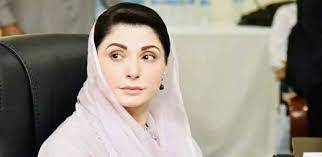
In Pakistan, where Benazir Bhutto twice served as Prime Minister but where no woman has held a top federal or provincial government position since her tragic assassination in 2007, the recent nomination of Maryam Nawaz for the position of Punjab Chief Minister has ignited a spark of hope. While the final decision remains pending, the mere possibility of her appointment holds immense significance in a country where women have historically faced significant barriers in reaching the highest echelons of political power.
Maryam Nawaz, the daughter of former Prime Minister Nawaz Sharif, is no stranger to the political arena. A central figure in her father's party, the Pakistan Muslim League-Nawaz (PML-N), she has weathered legal challenges and public scrutiny while remaining a vocal advocate for her party's ideology. If appointed, she would become the first woman to hold the prestigious position of Chief Minister in Punjab, the most populous and politically powerful province in Pakistan.
Pakistan's political landscape reflects a stark gender gap, with women vastly underrepresented both within parties and in broader systems. At the party level, female membership remains low, often hovering around 5%, and leadership positions are even more skewed towards men. This lack of representation stems from ingrained societal expectations, limited access to resources and training, and internal party structures that can be unwelcoming.
The national political system further amplifies this gap. Pakistan ranks second-to-last in the World Economic Forum's Gender Gap Index, with only 4.5% of senior, managerial, and legislative roles held by women. This translates to a mere 20% female representation in the National Assembly, with only 10% winning general seats; the rest are allocated through reserved quotas. This marginalization limits women's voices and perspectives on critical issues, hindering both policy effectiveness and societal progress.
Addressing this disparity requires a multi-pronged approach. Political parties must prioritize women's inclusion through targeted recruitment drives, capacity-building programs, and internal reforms promoting equal opportunities. Additionally, systemic changes like eliminating discriminatory electoral practices and strengthening legal frameworks protecting women's political rights are crucial. Only by tackling the issue at its roots can Pakistan bridge the gender gap and unlock the full potential of its female population on the political stage.
In Punjab, the nation's most populous and politically influential province, it would herald the first woman at the helm. This potential appointment holds immense symbolic value. It sends a powerful message to young girls and aspiring women, demonstrating that leadership positions are not solely reserved for men. It also challenges the traditional patriarchal mindset ingrained in Pakistani society, where women are often relegated to the sidelines in political discourse.
However, it is crucial not to view this nomination as a panacea for gender inequality in Pakistani politics. While the potential appointment of Maryam Nawaz as Punjab Chief Minister isn't a magic wand to erase gender inequality in Pakistani politics, it stands as a pivotal step in the right direction. Yet, celebrating this nomination as a definitive victory would be premature. While individual appointments are noteworthy, they must be accompanied by systemic reforms. This includes actively encouraging and training women within political parties, ensuring their voices are heard in decision-making processes, and dismantling discriminatory laws and societal norms that impede their political engagement.
Furthermore, strengthening electoral systems is crucial. Free, fair, and inclusive elections where women feel safe and empowered to contest and vote are essential for dismantling structural barriers. It is high time to create a level playing field where women can compete and win on their merit.
Maryam Nawaz's potential appointment, therefore, carries the weight of expectation. This opportunity must be leveraged to catalyse lasting change. This momentum must fuel targeted reforms and an empowering environment for women across all levels, shattering the glass ceiling and ushering in a truly inclusive Pakistani democracy.
This move by PMLN is a positive step towards gender equality in Pakistani politics. We can hope that other parties, such as PTI and PPP, will follow suit by creating clear pathways for their elected women to hold positions of leadership, such as ministerial roles, committee chairs, and party leadership positions.

